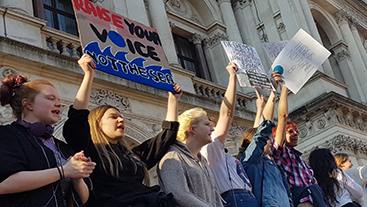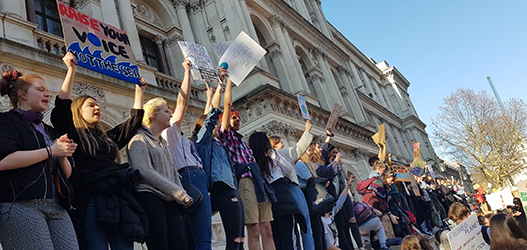Governments should respond to striking students with “strong actions” says Grantham Research Institute


Ahead of the global school strikes about climate change, Bob Ward, policy and communications director at the Grantham Research Institute on Climate Change and the Environment at the London School of Economics and Political Science, said:
“Governments around the world should respond to the striking students through strong actions and not just warm words or excuses, especially those with leaders who have supported these protests.
“Every country should commit to national targets for reducing their annual emissions of carbon dioxide and other greenhouse gases to zero, in line with the international goal of limiting global warming to well below 2 Celsius degrees. These commitments should be included in the revised national determined contributions to the Paris Agreement on climate change that are due to be submitted ahead of the United Nations climate change summit in 2020.
“The UK Government and politicians of all political parties have a responsibility to listen to these young people. They should act promptly on the advice of the Committee on Climate Change, due to be published in May, about putting into law a national target for reaching zero emissions.
“No politicians should want to find themselves on the same side as the discredited climate change deniers who have answered these young people with patronising abuse and insults.”
For more information about this media release please contact Kieran Lowe on +44 (0) 20 7107 5442 or k.lowe@lse.ac.uk or Bob Ward on +44 (0) 7811 320346 or r.e.ward@lse.ac.uk.
NOTES FOR EDITORS
- Lord Stern is chair of the Grantham Research Institute on Climate Change and the Environment and the ESRC Centre for Climate Change Economics and Policy, and I.G. Patel Professor of Economics and Government, at the London School of Economics and Political Science. From July 2013 to July 2017, Lord Stern was President of the British Academy for the humanities and social sciences. Lord Stern was with HM Treasury between October 2003 and May 2007. He served as Second Permanent Secretary and Head of the Government Economic Service, head of the review of the economics of climate change (the results of which were published in ‘The Economics of Climate Change: The Stern Review’ in October 2006), and director of policy and research for the Commission for Africa. His previous posts included Senior Vice-President and Chief Economist at the World Bank, and Chief Economist and Special Counsellor to the President at the European Bank for Reconstruction and Development. Baron Stern of Brentford was introduced in December 2007 to the House of Lords, where he sits on the independent cross-benches. He was recommended as a non-party-political life peer by the UK House of Lords Appointments Commission in October 2007. He was made a Fellow of the Royal Society in 2015 and a Companion of Honour in 2017.
- The ESRC Centre for Climate Change Economics and Policy (https://www.cccep.ac.uk/) is hosted by the University of Leeds and the London School of Economics and Political Science. It is funded by the UK Economic and Social Research Council (https://www.esrc.ac.uk/). The Centre’s mission is to advance public and private action on climate change through rigorous, innovative research.
- The Grantham Research Institute on Climate Change and the Environment (https://www.lse.ac.uk/grantham) was launched at the London School of Economics and Political Science in October 2008. It is funded by The Grantham Foundation for the Protection of the Environment (https://www.granthamfoundation.org/).
-ENDS-

